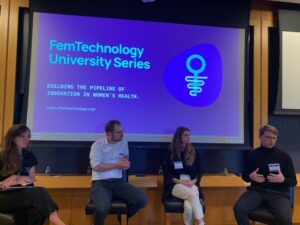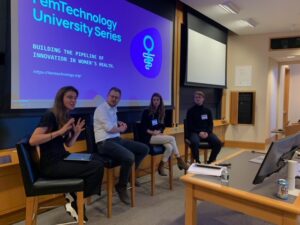
Panel & Networking event on the Future of Contraception Wed, Sept. 28th 2022!
Where: Harvard Business School
When: Wednesday September 28th, 4-6pm
Panelists:
Dama Health – A startup using a genetic test and an automated matching system to develop a personalized contraception recommendation platform for women and clinicians.
Rembrand M. Koning – Assistant Professor, Strategy Unit, Harvard Business School, whose recent work focuses on innovation in women’s health and in particular how Roe v. Wade’s reversal will stifle innovation in fertility and contraception.
Cirqle biomedical – Combining human-centric design and mucus engineering to launch a new era in contraception.
Moderated by FemTechnology Summit – Bringing together femtech startups, researchers, chief clinicians and university students for a 360 degree perspective on innovation in women’s health.
Why Join? What does the Future of Contraception look like? Are you curious about what the recent Roe v. Wade reversal means for the future of the field? Would you like to better understand how the European and US femtech landscape differ? Looking for an overview of the different approaches to contraception being taken (holistic prescriptions, genetic testing, non-hormonal contraception , review platforms and more)? Or would you just like to generally connect with others interested in women’s healthcare science, technology, and innovation?
Please join us (and feel free to share and bring friends) for this fascinating panel on the Future of Contraception as a part of FemTechnology Summit’s University Series 2022.

Some quotes from the panel :”The FemTech movement now is comparable to mental health 5 years ago. Nobody wanted to talk about it but now the stigma around it is starting to break down.”
“Europe is complicated. It’s fragmented. That’s why everyone looks to the US.”
“Women don’t have the same access to research, money and politics. The current decision makers do not prioritise women’s health.”
“Personalising contraception is the next step. 80 genomic all datasets will over perform an OBGYN not having these insights.”
“Women change contraception 3-4 times over the course of their lives. There is no one size fits a life solution. Preferences change over the course of a woman’s life. Their contraceptive choices should too.”
“While on average pharma companies put 25% of their revenue into R&D. Only 2% is spent on R&D in women’s health. This is a huge problem”
“We live in the legacy of a world built by men, for men. It’s no longer applicable to the world we live in today. We need to allocate money to people disrupting this system.”
“#Healthcare wasn’t designed with #women in mind. It needs to be completely reimagined to provide the quality of care the other half of the population deserves.”



